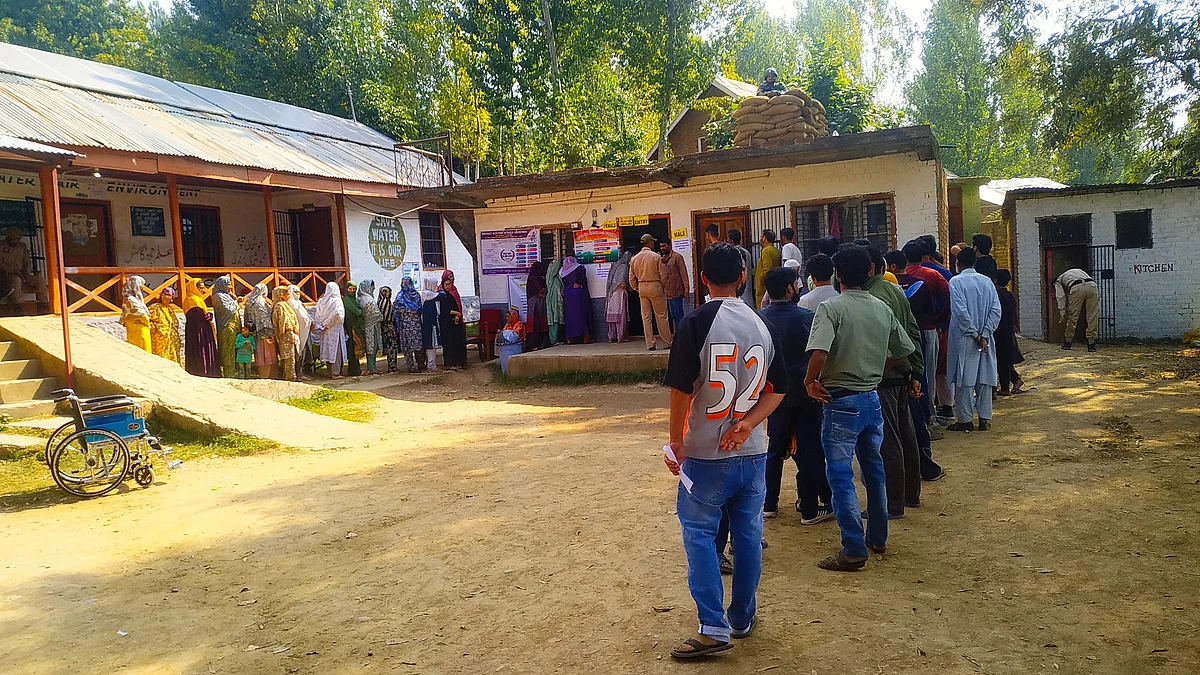Why foreign diplomats but no foreign journalists are allowed in J-K
No foreign journalist from New Delhi allowed to cover ‘historic’ J-K election, while YouTubers boast of moving freely at 9 pm

Even as diplomats from several countries arrived in Srinagar today, 25 September, at the invitation of the Indian government to observe the ‘festival of democracy’ and enthusiasm of the people to cast their votes during the second phase of polling, international journalists have been denied permission to cover the election in the Union Territory.
Reacting sharply to the foreign diplomats on a "conducted tour", former chief minister Omar Abdullah had this to say today after casting his vote: "The Government of India dismisses comments on J&K by foreign governments as India's internal matter but on the contrary has invited foreign diplomats as observers to J&K elections. I don't know why foreigners should be asked to check elections here. Why are only guided tours offered to foreign diplomats? Why aren't foreign journalists permitted to cover the event?
"The real credit for the successful polling turnout belongs to the individuals who have actively participated in exercising their right to vote in the assembly elections after a decade," he asserted and snapped that neither he nor the people needed any certificates from foreign diplomats.
High polling was recorded during the first phase of polling in the UT on 18 September, while the third and final phase of polling is due on 1 October. The first phase recorded 61 per cent polling, the highest in the past several decades; however, while the Indian government believes the high polling to be an endorsement of its policies since August, 2019, most voters on the ground appear to be looking for an alternative to the BJP.
The BJP in fact is contesting fewer than one-third of the seats and is banking on smaller parties, independents and the Jamaat-e-Islami, banned since 1972 for advocating separation from India, to cobble up a working majority after the election.
A foreign journalist posted on 18 September, “Kashmir goes to vote today in its first assembly elections for a decade - and the first since its statehood was revoked. The BJP is calling it a "success of democracy". Unfortunately, no foreign journalists were allowed to go”. It provoked the Managing editor of Kashmir Times Anuradha Bhasin to sardonically quip, “And local journalists are not allowed to report what they see and what they are told”.
In a podcast for Kashmir Times, Bhasin questions the statement of Union home minister Amit Shah that the Union government would decide if and when statehood would be restored to the Union Territory. What kind of democracy is this when the home minister says that only the BJP and prime minister Modi could restore statehood and nobody else, she asks.
Bhasin goes on to point out that she has watched unknown YouTubers and Influencers recording themselves at the busy commercial centre around Lal Chowk in Srinagar and boast that there was no fear, no stone pelting and the Internet was working just fine.
In sharp contrast, she recalled, local journalists were routinely stopped from recording videos and interviewing people. The experience of a correspondent of BBC India and Arfa Khanam Sherwani of the Wire was similar, with security personnel stopping them from talking to local people.
While Srinagar and the Lal Chowk area boasts selfie points where tourists can get themselves photographed, local journalists are routinely told that taking photographs is not allowed in the area.
After revoking J&K’s special status in 2019, splitting the state into two Union Territories, thus downgrading the only Muslim-majority state in the country, the internet was shut down for as long as six months. To show normalcy, national security advisor Ajit Doval was recorded having ‘biryani’ (presumably vegetable biryani) on a deserted street in Srinagar.
As many as 23 members of the European Parliament were specially flown into Srinagar on a two-day visit to see the normalcy for themselves. While the Valley observed a complete shutdown in protest, the MEPs were kept away from meeting people freely.
The invitation of MEP Chris Davies from the UK was withdrawn after he made a request to meet people without any escort. “I am not prepared to be part of a PR stunt for the Modi government and pretend that all is well. It is very clear that democratic principles are being subverted in Kashmir and the world needs to start taking notice,” he had said then in a statement.
Follow us on: Facebook, Twitter, Google News, Instagram
Join our official telegram channel (@nationalherald) and stay updated with the latest headlines